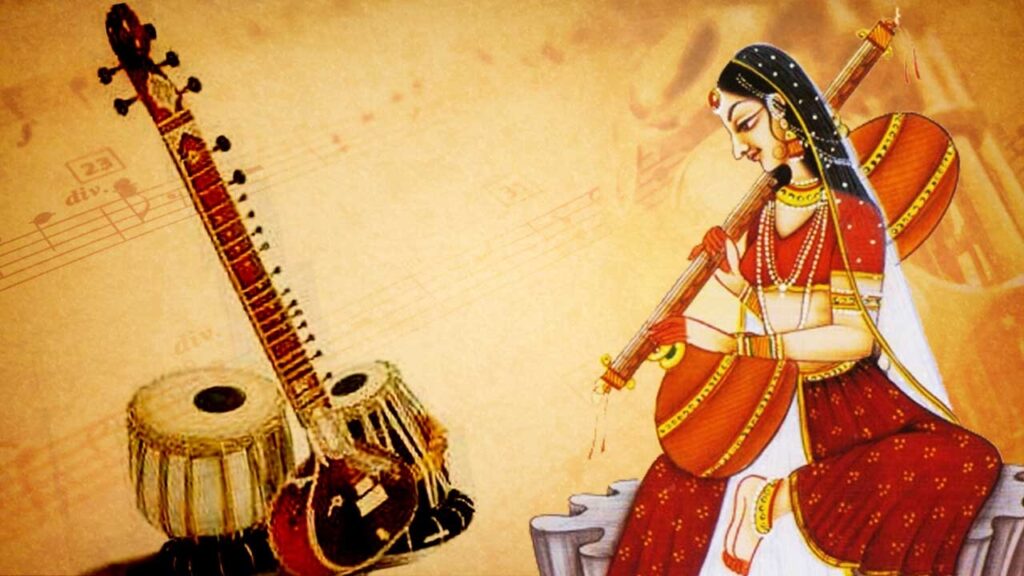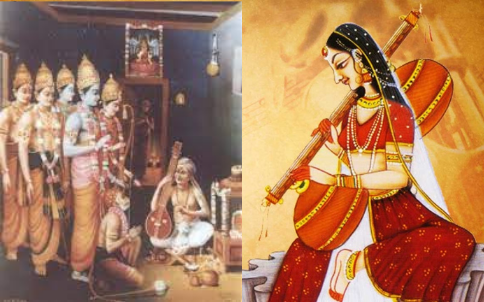Sree Ragam 15
This inspiring kriti of Tyagaraja also featured in old Telugu Classic Movie Chakrapani became popular and patronized by ardent devotees of Lord Rama, is set to Kharaharapriya Raga, possibly the first Raga rooted from pure listening experience called melody and the sruthi or scale.
“O Mother Seeta and O Lakshmana kindly reveal the secret so that I could follow the divine path of liberation”
Hence it is not surprising when Tyagaraja in this kriti in Kharaharapriya raga evoking emotions of Karuna and Devotion addresses Seeta and Lakshmana and enquires how Seeta and Lakshmana sought the divine grace of Lord Rama and could secure a place beside him.

Legend of Kharaharapriya
Kharaharapriya was originally known as Harapriyaand took birth through Lord Shiva. Lord Shiva graced Prathama Devathaswith the rendition of Vedas, who sat around him on either side and in front. As he chanted Vedas in turns looking at his audience on each side, Rig veda and Yajurveda sounded through the three notes and known as Swaritham,Udattam and Anudattam respectively with the Sruthi value of Sa, R2 and N2. To make the listening experience more clear and distinct the Prathama Ganas pleaded with Lord Shiva to chant the next Veda using all the seven notes. Acceding to the request Lord Shiva sang Sama Veda using all seven notes and it sounded more like music than a verse or chant and the Ganas named the Raga as Harapriya.
According to few musicologists, there exists a misconception that the rules of music originated from Sama Veda. In reality, Sama Veda emanated from Lord Shiva as Sama Ganam, as first ever musical piece set in a raga now known as Kharaharapriya.
Another mythological fable associated with the name of Kharaharapriya is, when Ravana wanted to bring Mount Kailasa to earth, Lord Shiva trapped him under Kailash to abstain him from doing so. And it was only when Ravana sang hymns in praise of Lord Shiva in Harapriya Shiva was pacified and acceded to his request.
Kharaharapriya is a regal raga, full of vigour and fervour. It is the 22nd Melakarta raga and is in prominence since ages and is associated with several therapeutic properties.
Music Therapy
In music therapy, Kharaharapriya is prescribed for treating sleep disorders, insomnia, heart problems and stress.It soothes our senses and relieves tension.
Structure
Arohana S R2 G1 M1 P D2 N2 S
Avarohana S N2 D2 P M1 G1 R2 S
Shadjam, ChatushrutiRishabam, SadaranaGandharam, SuddhaMadhyamam, Panchamam, ChatusrutiDaivatam, KaisikiNishadam
The original name of Harapriya was prefixed with Khara, to fit the raga into the nomenclature of ‘Katapayadi’ system. (Katapayadi is the numeric system followed to tabulate ragas into Melakarta ragas)
In Hindustani Classical music, KafiThaat is the equivalent of Kharahrapriya
The scale of Kharaharapriya has swaras placed at equal intervals and hence has aninimitableidentity. It is a versatile raga suitable for elaborate raga alapana, and is chosen as a main raga in musical concerts. The raga has scope for creating beautiful gamakas or oscillations because of the symmetrical tetrachords and creates ample scope for presenting harmonious combination of swaras.
Janya Ragas
Kharaharapriya has around 134 Janya ragas to its credit. Many of them are as popular or more in prominence than the parent raga. Abheri, Abhogi, Attana, Brundavana Sarangi, Kanada, Madhyamavathi and Sri ragam are a few among the bounty of Kharaharapriya.
Compositions
Kharaharapriya is one of the most popular and favourite raga of music composers. Among the invaluable compositions:
Tyagaraja
Korisevimparare
ChakkaniRajamargamundaga
PahiPahiRamayanuchu
Ramanisamanamevaru
Papanasam Sivan
After Tyagaraja, Papanasam Sivan in 20th century, composed around 23 Kritis in Kharaharapriya and perhaps this is the reason why he is known as ‘TamizhTyagayyar’. A few of Papanasam Sivan’s compositions are:
Appanavataritt
Aranamum
Janakipate
Annamacharya
Okaparikokapari
Interestingly Deekshitar and SyamaSastry of the Musical Trinity did not compose in Kharaharapriya raga.
In Film Music
Telugu
Sangeeta SahityaSamalamkrute (SwathiKiranam)
BalavuraMadana (Missamma)
MeghamaDehama (Manchu Pallaki)
PatakuPallaviPranam( Sangeeta Lakshmi)





Excellent medam